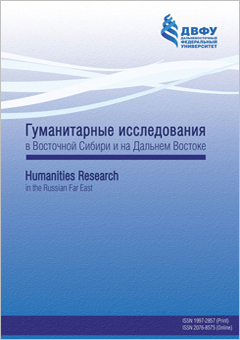Ethnocultural shifts in traditional environmental management of the Far North-East of Russia: from fur hunting to fur farming
DOI:
https://doi.org/10.24866/1997-2857/2024-1/57-67Keywords:
Far North-East of Russia, environmental management, indigenous population, Soviet economy, fur hunting, fur farmingAbstract
The article traces the causes, course and results of a fundamental ethnocultural shift in the traditional environmental management of indigenous population of the Far North-East of Russia – the transition from fur hunting to fur farming. Cheap food supply (waste from marine hunting) and the presence of a significant number of unemployed indigenous people were seen as key factors to the growth of this innovative industry. However, its development was not adequately supported by technical means. The abundance of food supply did not guarantee its preservation and freshness. Due to hard physical labor that prevailed on fur farms, they constantly experienced a shortage of personnel, while most of the workers were non-residents. The cessation of state support in the post-Soviet era led to the complete liquidation of the industry.
Downloads
References
Бацаев И.Д. Сельское и промысловое хозяйство Северо-Востока России 1929–1953 гг. Магадан: СВКНИИ ДВО РАН, 1997.
Бацаев И.Д. Очерки истории Магаданской области (начало 20-х – середина 60-х гг. ХХ в.). Магадан: СВКНИИ ДВО РАН, 2007.
Козлов Ю. Весомая прибавка // Советская Чукотка. 1979. 19 января.
Коломиец О.П. К истории развития морского зверобойного промысла на Чукотке // Вестник Омского университета. Серия «Исторические науки». 2019. № 3. С. 223–231.
Мынгынкау П. Киты живые и мертвые // Советская Чукотка. 1990. 30 октября.
Новицкий В. Снежные тропы Армаиргина // Советская Чукотка. 1979. 25 апреля.
Ондатры в Восточной тундре // Советская Чукотка. 1954. 23 апреля.
Смирнов Г. Зовут охотничьи тропы // Советская Чукотка. 1979. 27 ноября.
Хаховская Л.Н. Коренные народы Магаданской области в ХХ – начале XXI в. Магадан: СВНЦ ДВО РАН, 2008.
Хаховская Л.Н. Морские зверобои Чукотки в период первоначальных советских реформ // Этнографическое обозрение. 2012. № 6. С. 168–182.
Downloads
Published
Issue
Section
License
Copyright (c) 2024 Людмила Николаевна Хаховская

This work is licensed under a Creative Commons Attribution-NonCommercial-NoDerivatives 4.0 International License.














